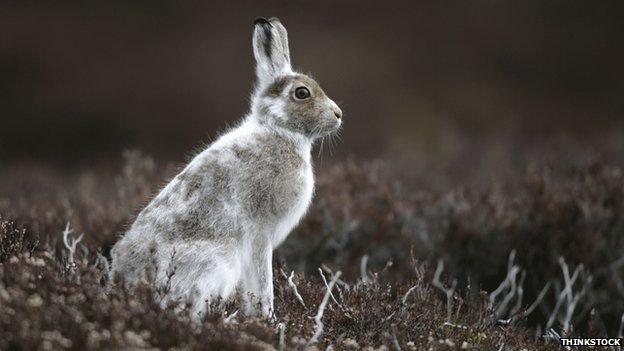Wildlife organisations call for three-year ban on mountain hare culls
- Published
Tim Baynes, director of the Scottish Moorland Group, part of Scottish Land and Estates, and Simon Jones from the Scottish Wildlife Trust have been speaking to BBC Scotland.
Ten wildlife and conservation organisations are calling for a three-year ban on the culling of mountain hares on Scotland's grouse moors.
The moors provide an ideal habitat for mountain hares.
But gamekeepers may cull the animals in an effort to protect red grouse from the tick-borne louping ill virus.
Wildlife groups say there is a lack of scientific evidence to support the claim that culling hares protects grouse.
Population monitoring
Simon Jones of the Scottish Wildlife Trust, one of the groups campaigning for a moratorium, said: "We, along with the other organisations, are calling for a three year ban, to allow time for all those involved to take stock of the longer term impacts of large scale culling.
"Once the results of the study have been published we will then be able to identify the best ways to monitor mountain hare populations and measure the impact that management is having on their conservation status.
"The unregulated and seemingly unsustainable culling that is endemic on many grouse moors is a threat to these important populations."
Duncan Orr-Ewing of RSPB Scotland said: "Very little is known about their current numbers of mountain hares and population trends.
"We also don't know what impact these large scale culls are having on mountain hares' wider conservation status, which could mean the Scottish Government may be in breach of its legally binding international EU obligations to this species."
'Growing problem'
The calls for a ban have drawn an angry response from gamekeepers' leaders.

Scotland has almost all of the British mountain hare population
A spokesman for the Scottish Gamekeepers Association said: "For groups with environmental credentials to call for such an environmentally irresponsible measure beggars belief.
"The numbers of tick, already a growing problem in the countryside, will escalate, endangering any bird that nests on the ground, not to mention the potential repercussions for human health.
"It will be bad for birds and bad for biodiversity."

The ten organisations calling for the three year ban are:
· Highland Foundation for Wildlife
· John Muir Trust
· National Trust for Scotland
· RSPB Scotland
· Royal Zoological Society of Scotland
· Scottish Raptor Study Group
· The Scottish Wildlife Trust
· The Cairngorms Campaign
· The Mammal Society
· The Badenoch and Strathspey Conservation Group

Meanwhile, landowners have said such a move would be "ill informed" and "heavy handed".
Tim Baynes of the Scottish Moorland Group told BBC Scotland: "We firmly believe the management of the hare population as it is at present is sustainable.
"This does mean some culling for sound habitat conservation reasons, but not to the extent where it threatens a population.
"We know in broad terms the numbers of hares and it is a population that is thriving."
Calls for restraint
Scottish Natural Heritage has pledged to work with "all interested parties" to make sure that management practices are not damaging the species' long-term prospects.
Responding to the call for a moratorium, a spokeswoman said: "Mountain hare populations can fluctuate widely and are influenced by a range of factors - the cyclical nature of the species, habitat fragmentation, changes in land use and over-culling
"We have already asked estates for restraint on large-scale culls of mountain hares which could jeopardise their conservation status.
"We continue to gather evidence on numbers, status and changes and for this reason have commissioned further research by Game and Wildlife Conservation Trust and the James Hutton Institute to inform local and national management."